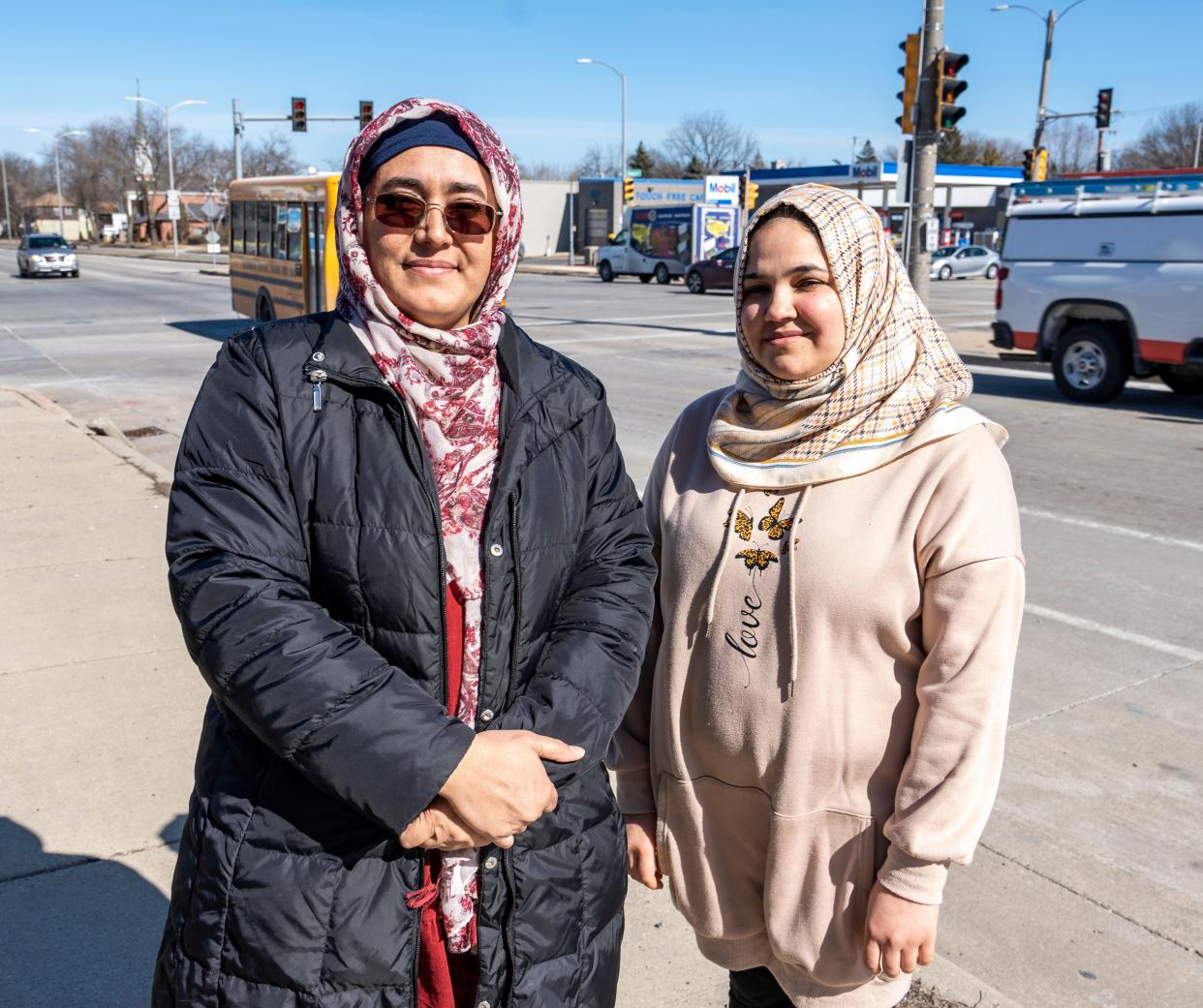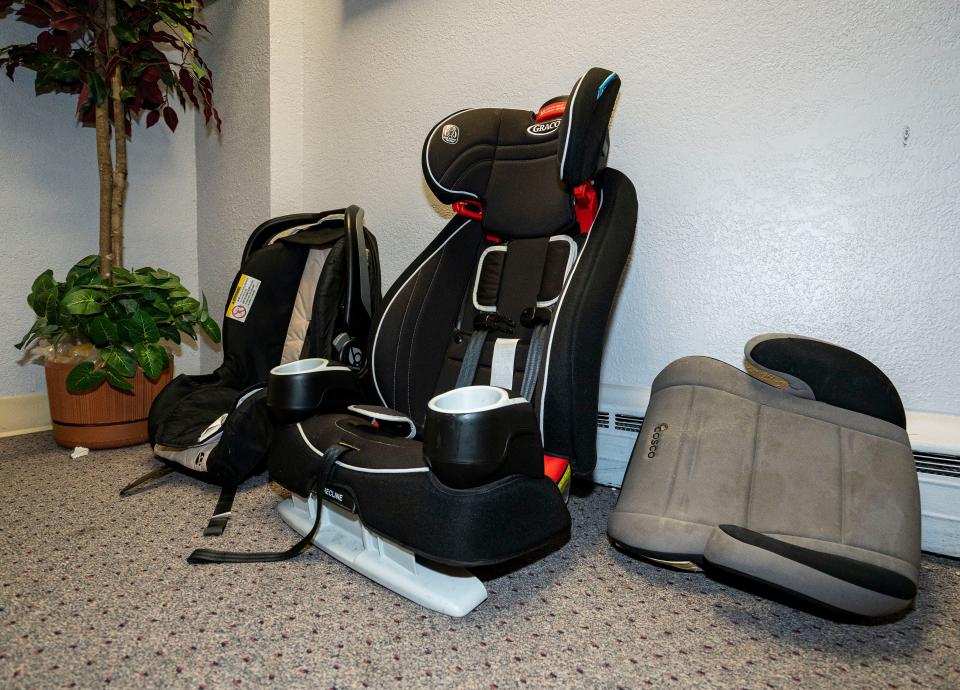Afghan refugee women learn to drive in Milwaukee so they can support their families

When late one night, Shokofa Maliky’s husband fainted from low blood sugar, she knew what she had to do.
She got him into their car and drove to a Milwaukee-area hospital. Later, when he recovered from his diabetic emergency, he told her: You saved my life.
Thank God she had learned to drive, he said.
It was a situation Maliky, 24, wouldn’t have experienced in Afghanistan, her home until she fled the Taliban takeover in 2021. Because of cultural norms and concerns over personal security, women rarely drove there, even before the Taliban regained control of the country and severely restricted the role of women in the public sphere. Husbands and male relatives handled transportation.
Maliky is one of about a dozen Afghan women in Milwaukee who have either received their drivers licenses or are in the process, thanks to a driver's education program from Hanan Refugees Relief Group, a local refugee resettlement agency.
Demand for the driving classes is growing, as another group of eight or nine women is waiting eagerly to begin the program. They know that driving is a crucial tool to achieving independence and self-sufficiency in the United States.

“They want to support themselves and support the other family members that stayed behind in Afghanistan,” said Maryam Durani, Hanan’s cultural program coordinator who was a renowned women’s rights activist in Afghanistan.
The resettlement agency provides classes for the women in which they learn the rules of the road and key driving terminology in English. Then, Hanan covers costs and helps them sign up for behind-the-wheel lessons, the written exam and the road test.
Durani interpreted comments from three Afghan mothers who completed the program as they were interviewed by the Journal Sentinel.
Driving offers economic independence
For the women, knowing how to drive in the U.S. means a world of opportunity becomes available to them. They are less reliant on public buses, and can apply for higher-paying jobs, without worrying about whether they are a bit out-of-the-way.
They can grocery shop on their own, or pick up a sick child from school without asking their husband to leave work. As Maliky’s case proved, they can help in case of an emergency.
There are ripple effects. With a car to drive to a job, women can achieve a level of economic independence. Earning an income means more leverage in making decisions in a marriage, Durani said.
Gullalai Karimi, 23, wants to start working soon to provide for her family like her husband does. The couple has three children, ages 7, 5 and 1, and if she had a job, she would need to take her baby to daycare and then drive herself to work.
To Karimi, driving — and earning money — are the keys to a better future for her family. She and her husband would like to buy a house or a second car.
“I want to help my husband achieve this goal,” she said.

Karimi always wanted to drive as a teenager in Afghanistan, but she got married and stayed home to raise her children. Driving was not an option.
“Here, I come, I see I have that opportunity, and I try,” she said.
Maliky, also a mother of three, laughed recalling that, in her first year in the U.S., her husband had the same mentality as in Afghanistan. Why should she learn to drive? She didn’t need to, he thought.
But after a year of Maliky calling him to take the children to appointment after appointment, he relented.
“No, no, go learn,” she remembered him saying.
Learning the rules of the road came with challenges. Safia Rahimi, 32, failed the road test twice before passing it in November. Maliky failed it once.
The women laughed when they recall silly mixups — like when Maliky sat down in the car, buckled her seatbelt and was confused why the car wasn’t running. The keys were in her pocket.
More: 'A dream come true for me': A specialized wheelchair has given an Afghan refugee independence, hope
Women still processing trauma of breaking up families
Sharing these moments of levity has provided a measure of relief and comfort for the women. Adjusting to life in the U.S. has not been easy.
Durani said Afghans in Milwaukee are still processing the trauma of the Taliban takeover and their sudden evacuation in August 2021. Many had to leave parents, spouses and even children behind, and they worry about their family’s safety there.
Karimi and her father speak on the phone daily. She’s happy she’s in the U.S., so she can give her children safe lives, but she misses the rest of her family dearly.
Her parents left Afghanistan and are refugees in Iran, but their quality of life and economic prospects are not good. Iran has deported hundreds of thousands of undocumented Afghans in recent months.
Rahimi has had an especially difficult time. Her husband was not able to join her when she evacuated Afghanistan with their 18-month-old son and her mother-in-law, and he remains in the country today.
Her son is now 4 years old, and she has raised him as a single mother. He tends to be socially withdrawn, emotional and nervous that he will lose his mother as well, Rahimi said.
Before getting her license, she relied on coworkers to drive her to Mukwonago, where she works second-shift as a machine operator at Milwaukee Tool. That meant if her mother-in-law became sick and Rahimi had to leave work, she would need another person to leave work and drive her as well.
“Now I’m more comfortable because I have a car. So if something happens, I can decide more easily than before” what to do, Rahimi said.
When Rahimi arrived in the U.S., she said she didn’t know the language or the culture and didn’t have a support network of family as she did in Afghanistan. Now, she said she has made some friends who can help her. But still, “it’s very hard.”
Rahimi cried, speaking about the brokenness and guilt she feels. Living safely in the U.S. doesn’t equate with happiness when a person has lost everything, Durani explained.
“Safia doesn’t know when her husband will come. Will he come or not come? You can’t imagine any goals for your future,” Durani said.
Although the women have endured hardship after hardship, they’re motivated to give their children better lives. They dream of their children living in peace, getting an education and one day helping others.
“I left my country because of my children,” Karimi said.
Learning to drive is just a piece of the future they will build for their families.
This article originally appeared on Milwaukee Journal Sentinel: Afghan women earn driver's licenses with Milwaukee resettlement agency
Solve the daily Crossword

